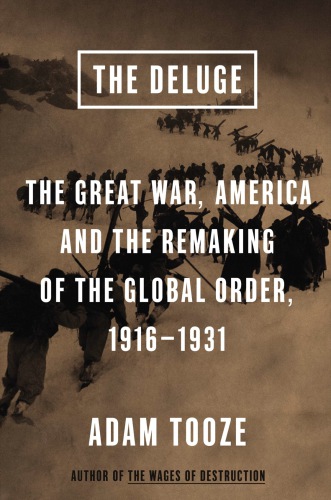
The Deluge
The Great War, America and the Remaking of the Global Order, 1916-1931
کتاب های مرتبط
- اطلاعات
- نقد و بررسی
- دیدگاه کاربران
نقد و بررسی

Starred review from September 1, 2014
Tooze (The Wages of Destruction), professor of history and codirector of international security studies at Yale University, successfully maps the "emergence of new order of power" from the ashes of WWI. That order was U.S.-centered and had "three major facetsâmoral authority backed by military power and economic supremacy"âand, Tooze argues, it arose in the context of a "multisided, polycentric search for strategies of pacification and appeasement." America intervened somewhat unwillingly in WWI, after the Eurasian crisis dragged out for several years. Its entry into the war allowed the Entente to secure a victory, but the Treaty of Versailles yielded only a "patchwork world order." The U.S.'s synergy of "exceptionalist ideology" and "Burkean wisdom" gave it a conservative perspective on its futureâa perspective that, Tooze argues, clashed immediately with its "pivotal role" in a fragile global economy. The "great democratic alliance" imploded during the Great Depressionânot from "deluded idealism," but from a search for a "higher form of realism." Tooze's grand economic history is stimulating, persuasive, and surprisingly accessible. Illus. Agency: Wylie Agency.

Starred review from October 1, 2014
A vigorously defended argument that the war to end all wars was really the origin of a new world order and American superpower. Taking a truly global view of World War I, Tooze (History/Yale Univ.; The Wages of Destruction: The Making and Breaking of the Nazi Economy, 2007, etc.) holds that the conflict was Europe's undoing in more ways than one. Obviously, it laid the groundwork for the global war to follow, but it also announced the arrival of an America that was able to act unilaterally on the world stage. The huge bloodletting also left the losing, and even some of the victorious, powers politically unstable. The author highlights Hitler, of course, but also Leon Trotsky as representatives of a sweeping change by which the war "opened a new phase of 'world organization.' " What is novel about Tooze's thesis is that, in this light, Hitler, Mussolini and the military leaders of Imperial Japan saw themselves as rebels against this new world order, which oppressed Germany financially and dismissed Italian and Japanese claims for rewards for their parts in defeating the Central Powers; all resented the notion that the terms of the transition to this new world order were dictated by the upstart United States. Interesting, too, is the author's interpretation of America's artful use of soft power, favoring political and economic influence over direct military intervention whenever possible. One negative consequence was Wilson's negotiation of a "peace without victory" at the end of the war that promoted a subsequent instability made lethal with the worldwide economic collapse a decade later. In discussing what he calls "the fiasco of Wilsonism," Tooze sometimes drifts into highly technical economic matters such as the mechanics of hyperinflation, but his narrative is gripping-and sobering, since readers well know the tragedies that followed. A lucid, first-rate history of the results of a war whose beginning a century ago we are busily commemorating.
COPYRIGHT(2014) Kirkus Reviews, ALL RIGHTS RESERVED.

November 1, 2014
Tooze (history, Yale Univ.; The Wages of Destruction) examines how the peace and international order established at the end of World War I disintegrated. While most histories of the interwar period blame the collapse on unfair demands placed upon Germany at Versailles and the chaos that accompanied the worldwide great depression, Tooze focuses on the ascendency of the United States as a global superpower. Rather than viewing Woodrow Wilson as merely a liberal internationalist, the author argues that Wilson was a conservative in the sense that he wanted to reestablish the status quo of the 19th-century Gilded Age, with America leading international affairs. Key to Wilson's plan for U.S. dominance was control over international finance. By forcing Great Britain and France to accept drastically reduced German reparations while offering no concessions on interallied war debt, Wilson and his successors were able to manipulate the internal fiscal policies as well as the foreign policies of most of the other major powers in the world. The author argues that rather than American isolationism, it was American mismanagement of the international scene that led to the rise of totalitarianism and World War II. VERDICT A thoroughly researched, much-needed reexamination of America's role in the aftermath of World War I that will appeal to any reader interested in the interwar period. [See Prepub Alert, 6/2/14.]--Michael Farrell, Reformed Theological Seminary, Orlando, FL
Copyright 2014 Library Journal, LLC Used with permission.

November 1, 2014
In the centennial of WWI, Tooze's work affords a reminder of that conflict's immense impact on world history. Of the war's myriad effects, Tooze chooses to narrate the emergence of the U.S. as the paramount power on the global stage. Initially impelled by America's war loans to Britain and France, U.S. involvement assumed political dimensions under President Woodrow Wilson. Beneath intricate detail about the form Wilson's ideals took in the armistice and peace treaties, Tooze focuses on the desperate economic conditions that prevailed immediately after the war. Implicating the Entente's debt to the U.S. and Germany's reparations bill to the Entente, national finances and their influence on each power's security position in the postwar world form Tooze's factual foundation. Abundant facts and figures stud his account of the postwar crises up to the end point of 1931, when President Herbert Hoover suspended debt and reparations repayments. Whatever that action's merits, it illustrated the ability of the U.S. to act unilaterally. With this new power-factor as his theme, Tooze's analysis, particularly of fears the American capitalist juggernaut provoked, should spark debate, especially in scholarly circles.(Reprinted with permission of Booklist, copyright 2014, American Library Association.)

























دیدگاه کاربران